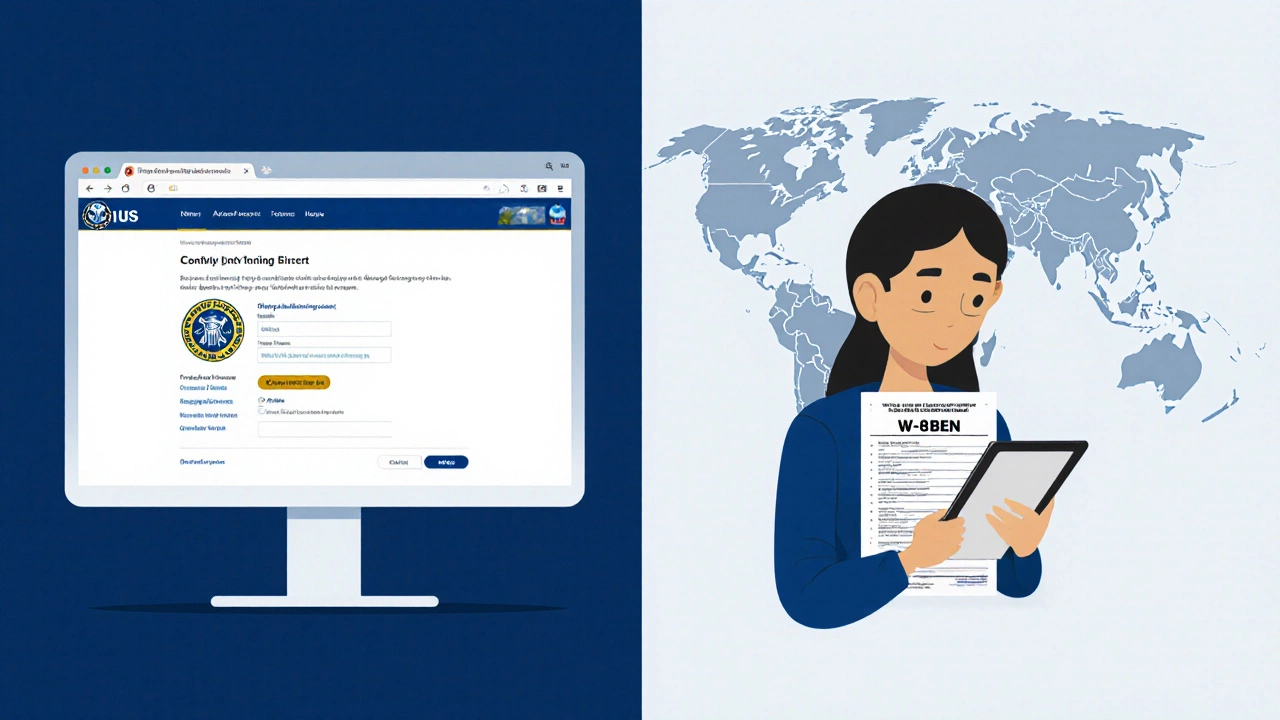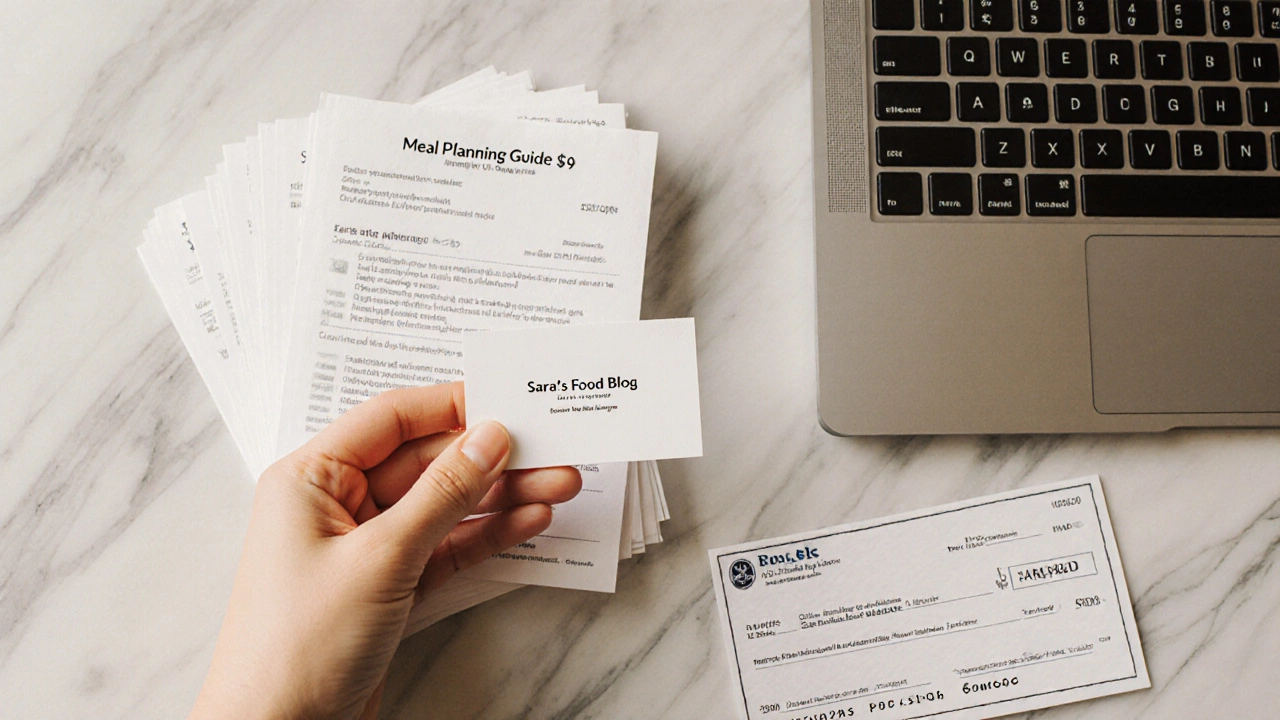If you’re running a blog and making money from it, you might have heard you need an EIN. But do you really? The answer isn’t yes or no-it depends on how you run your blog and where you live. If you’re based in the U.S. and earning income from your blog, the IRS might require an EIN. If you’re outside the U.S., like in the UK, you almost certainly don’t need one. Let’s cut through the confusion.
What Is an EIN, Anyway?
An EIN, or Employer Identification Number, is a nine-digit number the IRS gives to businesses in the U.S. It’s not a social security number. It’s not a license. It’s just a tax ID for your business entity. You use it to open a business bank account, file taxes, hire employees, or apply for business credit.
Most solo bloggers don’t need an EIN unless they’ve set up their blog as a formal business. If you’re just writing posts, putting up Google Ads, and getting paid via PayPal, you’re likely operating as a sole proprietor-and that means you can use your Social Security Number (SSN) for tax reporting.
When You Definitely Need an EIN
You’ll need an EIN if any of these apply to you:
- You’ve formed an LLC, corporation, or partnership for your blog
- You hire employees to write, edit, or manage your blog
- You want to open a business bank account in the U.S.
- You sell products or digital goods through your blog (like eBooks or courses)
- You’re a non-U.S. resident earning U.S.-sourced income from your blog
For example, if you run a blog that sells a $29 course on WordPress SEO, and you’re a U.S. resident, you’ll likely need an EIN to report that income properly. If you’re a U.S. citizen with a blog that earns $500 a month from affiliate links and you’ve never incorporated, you don’t need an EIN-yet.
What About Non-U.S. Bloggers?
If you live in the UK, Canada, Australia, or anywhere outside the U.S., you don’t need an EIN for your blog. The IRS doesn’t require it. Instead, you follow your own country’s tax rules. In the UK, you register as self-employed with HMRC. You report your blog income on a Self Assessment tax return. You don’t need an EIN. You need a Unique Taxpayer Reference (UTR).
Here’s the catch: if you earn money from U.S.-based companies-like Amazon Associates, AdSense, or Patreon-and you’re outside the U.S.-you might need to fill out a W-8BEN form. That’s not an EIN. That’s a form that tells the U.S. company you’re a foreign person and not subject to U.S. withholding tax. Many bloggers get confused here. They think they need an EIN because a U.S. company asked for tax info. They don’t.

Why Do People Think They Need an EIN?
Because a lot of online advice is misleading. You’ll see YouTube videos saying, “Get an EIN before you start monetizing your blog.” That’s not true. It’s overkill for most beginners. Bloggers who get this advice are often told to “look professional” or “avoid tax trouble.” But the truth is, the IRS doesn’t care if you use your SSN to report $1,000 in blog income. They care if you report it at all.
Platforms like WordPress.com, Blogger, or Medium don’t ask for an EIN. They ask for your name, address, and tax ID number. If you’re a U.S. person, they’ll accept your SSN. If you’re not, they’ll ask for your foreign tax ID or W-8BEN. No EIN required.
When Should You Get One Anyway?
Even if you don’t need an EIN, you might want one. Here’s why:
- It protects your personal identity. Instead of giving out your SSN to advertisers, you give them your EIN.
- It makes your blog look more legit to brands. If you pitch a company for a sponsored post, saying “I’m a sole proprietor with an EIN” sounds more professional than “I just use my SSN.”
- It helps you open a business bank account. Even if you’re a sole proprietor, some banks won’t let you open a business account without an EIN.
- It’s free and easy to get. You can apply online at the IRS website in minutes.
So if you’re making over $10,000 a year from your blog, or you’re planning to scale, getting an EIN is a smart move. It’s not a legal requirement-but it’s a smart business step.
How to Get an EIN (If You Decide To)
Getting an EIN is free and fast if you’re a U.S. resident. Here’s how:
- Go to irs.gov/ein (the official IRS site)
- Click “Apply online now”
- Answer the questions about your business structure
- Provide your SSN or ITIN (you must have one)
- Submit and get your EIN immediately
You’ll get your EIN right away. No waiting. No fees. No paperwork to mail. If you’re not a U.S. resident, you can’t apply online. You’ll need to fax or mail Form SS-4 to the IRS. That takes 4-6 weeks. Most non-U.S. bloggers skip this entirely.

What Happens If You Don’t Have One?
If you’re a U.S. blogger making under $400 a year, you don’t even need to file a tax return. If you make more than $400, you file Schedule C with your personal tax return. You use your SSN. No EIN needed.
If you’re a non-U.S. blogger, you file taxes in your home country. No EIN. No IRS forms. Just your local tax rules.
Not having an EIN won’t get you in trouble unless you’re pretending to be a U.S. business when you’re not. The IRS doesn’t chase down bloggers who use their SSN. They chase down people who hide income.
Real-World Example: Sarah’s Blog
Sarah, a blogger in Ohio, started a food blog in 2023. She made $8,000 from affiliate links and display ads. She didn’t have an EIN. She used her SSN when setting up AdSense. She filed Schedule C with her 1040. No issues. In 2024, she hired a freelance editor and started selling a $49 meal-planning PDF. That’s when she applied for an EIN. It took 12 minutes. Now she pays her editor under her EIN and opens a separate business account. She didn’t need it before-but now it makes sense.
Bottom Line: EIN or Not?
You don’t need an EIN to start a blog. You don’t need one to make $1,000. You don’t need one if you’re outside the U.S.
You need an EIN if you’re a U.S. resident and you’ve turned your blog into a real business-with employees, products, or a formal structure.
Don’t let fear or hype push you into getting an EIN before you need it. Focus on writing great content, growing your audience, and reporting your income honestly. That’s what the IRS actually cares about.
Do I need an EIN if I make money from my blog?
Only if you’re a U.S. resident and have formed a business entity like an LLC, or if you hire employees. Most solo bloggers can use their Social Security Number instead. If you’re outside the U.S., you don’t need an EIN at all.
Can I use my SSN instead of an EIN for my blog?
Yes. If you’re a sole proprietor in the U.S. and you’re not hiring employees or forming a legal business entity, your SSN is perfectly fine for reporting blog income to platforms like AdSense or Amazon Associates.
Do I need an EIN to get paid by U.S. companies?
No. If you’re outside the U.S., you fill out a W-8BEN form to prove you’re a foreign person. U.S. companies don’t require an EIN from non-residents. If you’re in the U.S., they’ll ask for your SSN or EIN-but you can use your SSN unless you’ve incorporated.
Is an EIN the same as a business license?
No. An EIN is a federal tax ID from the IRS. A business license is issued by your city or county and lets you operate legally in that area. You might need both, but they’re not the same thing. Most bloggers don’t need either unless they’re selling physical products.
What if I’m a non-U.S. blogger and I get a 1099 from a U.S. company?
If you’re outside the U.S. and received a 1099, you likely filled out a W-8BEN form. The company sent the form because they’re required to report payments over $600. You don’t need to file a U.S. tax return unless you’re a U.S. citizen or resident. Report the income in your home country’s tax system.
Can I get an EIN without a Social Security Number?
If you’re not a U.S. citizen or resident, you can’t apply for an EIN online. You must mail or fax Form SS-4 to the IRS and provide a valid foreign tax ID or ITIN. Most non-U.S. bloggers skip this step entirely because it’s not required and takes weeks to process.
